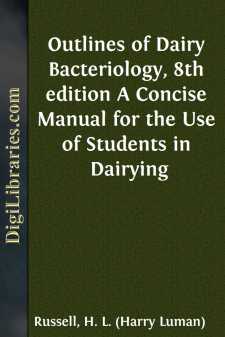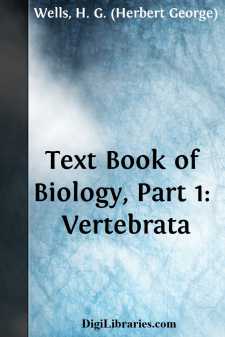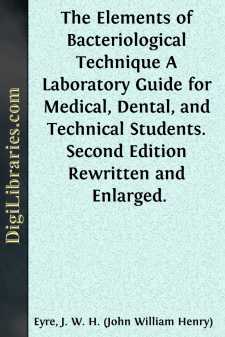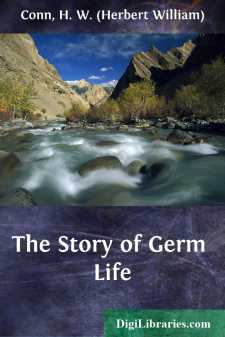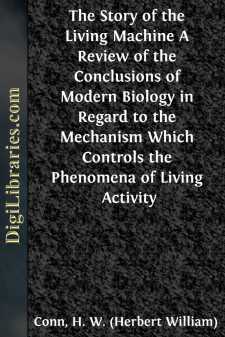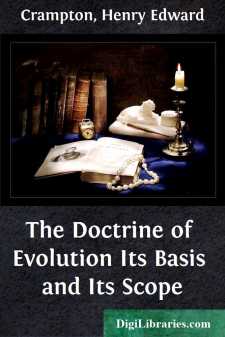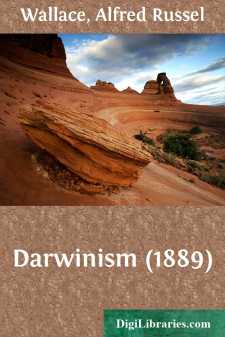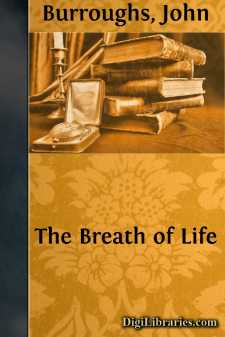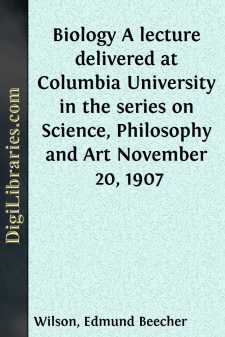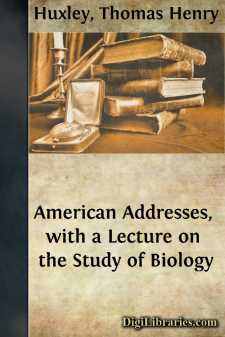Science
- Astronomy 18
- Biology
- Chemistry 13
- Electricity 1
- General 38
- History 6
- Light 1
- Paleontology 2
- Philosophy & Social Aspects 1
- Physics 3
- Relativity 2
- Study & Teaching 1
- Waves & Wave Mechanics 1
Biology Books
Sort by:
CHAPTER I. STRUCTURE OF THE BACTERIA AND CONDITIONS GOVERNING THEIR DEVELOPMENT AND DISTRIBUTION. Before one can gain any intelligent conception of the manner in which bacteria affect dairying, it is first necessary to know something of the life history of these organisms in general, how they live, move and react toward their environment. Nature of Bacteria. Toadstools, smuts, rusts and mildews are...
more...
In the year 1884 I was invited to give tuition by correspondence, in Biology. Although disposed at the time to ridicule the idea of imparting instruction in natural science by letter, I gladly accepted the opportunity thus afforded me of ascertaining for myself what could and could not be accomplished in that direction. Anyone familiar with the scope of biological enquiry, and the methods of biological...
more...
I. LABORATORY REGULATIONS. The following regulations are laid down for observance in the Bacteriological Laboratories under the direction of the author. Similar regulations should be enforced in all laboratories where pathogenic bacteria are studied. Guy's Hospital. BACTERIOLOGICAL DEPARTMENT. HANDLING OF INFECTIVE MATERIALS. The following Regulations have been drawn up in the interest of those...
more...
CHAPTER I. BACTERIA AS PLANTS. During the last fifteen years the subject of bacteriology [Footnote: The term microbe is simply a word which has been coined to include all of the microscopic plants commonly included under the terms bacteria and yeasts.] has developed with a marvellous rapidity. At the beginning of the ninth decade of the century bacteria were scarcely heard of outside of scientific...
more...
CHAPTER I. IS THE BODY A MACHINE? The problem before us in this section is to find out to what extent animals and plants are machines. We wish to determine whether the laws and forces which regulate their activities are the same as the laws and forces with which we experiment in the chemical and physical laboratory, and whether the principles of mechanics and the doctrine of the conservation of energy...
more...
I EVOLUTION. THE LIVING ORGANISM AND ITS NATURAL HISTORY The Doctrine of Evolution is a body of principles and facts concerning the present condition and past history of the living and lifeless things that make up the universe. It teaches that natural processes have gone on in the earlier ages of the world as they do to-day, and that natural forces have ordered the production of all things about which...
more...
WHAT ARE "SPECIES," AND WHAT IS MEANT BY THEIR "ORIGIN" Definition of species—Special creation—The early Transmutationists—Scientific opinion before Darwin—The problem before Darwin—The change of opinion effected by Darwin—The Darwinian theory—Proposed mode of treatment of the subject. The title of Mr. Darwin's great work is—On the Origin of Species by means of...
more...
by:
John Burroughs
I I When for the third or fourth time during the spring or summer I take my hoe and go out and cut off the heads of the lusty burdocks that send out their broad leaves along the edge of my garden or lawn, I often ask myself, "What is this thing that is so hard to scotch here in the grass?" I decapitate it time after time and yet it forthwith gets itself another head. We call it burdock, but...
more...
BIOLOGY I must at the outset remark that among the many sciences that are occupied with the study of the living world there is no one that may properly lay exclusive claim to the name of Biology. The word does not, in fact, denote any particular science but is a generic term applied to a large group of biological sciences all of which alike are concerned with the phenomena of life. To present in a...
more...
THE THREE HYPOTHESES RESPECTING THE HISTORY OF NATURE. We live in and form part of a system of things of immense diversity and perplexity, which we call Nature; and it is a matter of the deepest interest to all of us that we should form just conceptions of the constitution of that system and of its past history. With relation to this universe, man is, in extent, little more than a mathematical point;...
more...


